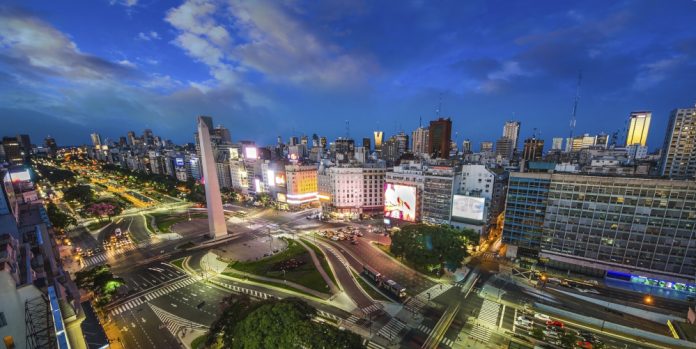The Province of Buenos Aires kicked off 2021 with the great news that seven international and national companies had been selected to operate in its online gambling market. As one of the selected companies along with Hotel Casino Tandil, Playtech was able to secure a place in one of the most promising markets on the continent.
Francesco Rodano, CPO of Playtech, told SBC that obtaining a license in that market “is a landmark moment for the company,” since the Province of Buenos Aires is the largest in Argentina and “the opening of its market set an example not only to other provinces, some of which have been regulating their respective markets in the last two years, but also, possibly, to other countries in the region”.
Currently, almost 90% of Playtech’s global revenue comes from the regulated markets in which it operates. The Province of Buenos Aires will be its third important regulated market in Latin America, after Mexico and Colombia, where the online gambling giant already has in place strategic alliances with top-tier local operators, such as Caliente and Wplay, respectively.
The potential of the Province of Buenos Aires does not rely solely on the passion of Argentinians for sports – specifically football – but also because of the number of people who live there. With more than 16 million people in approximately 300 thousand square meters, it’s 50% larger than countries like Belgium, Portugal or Sweden, and double the size of Switzerland or Denmark. All these countries, which benefit from developed regulatory frameworks, represent significant markets for Playtech.
“Here, we have the chance to work through joint ventures, together with our local partner, Hotel Casino Tandil, and as a games supplier of the other 6 licensees,” Rodano added.
So what does it represent in terms of commercial impact, opportunities and business potential? According to the company’s CPO, the license in the Province opens up very promising business opportunities, thanks also to the sensible regulation that the Provincial Institute of Lotteries and Casinos (IPLyC) has implemented, which will pave the way for a healthy and sustainable development of the market.
To participate in the licensing process, the IPLyC asked international companies to submit their proposals with a local partner. The decision to choose Hotel Casino Tandil was based on the fact that the Argentinian company knows the local retail casino business and has a loyal customer base.
“At Hotel Casino Tandil we found people who are really passionate about the new opportunity offered by the launch of the market. We have 22 years of experience in managing online gambling ventures, and developed the world-leading gaming platform that comes with state-of-the-art KYC, AML, CRM, payments and responsible gambling tools. By combining the respective assets and strengths, we found a perfect match,” Rodano explained.
Launch plans
Despite having announced the selected companies on the last day of December 2020, the local regulator has yet to mention when the market will be up and running. As for Playtech’s estimates regarding the launch and if it’s prepared to start operating once the light goes green, its size and relevance allows it to be ready to depend on its own times.
Playtech works in more than 30 regulated jurisdictions across the world, so it has the experience and knowledge of the complexities that regulators face when working on launching a new market.
“We expect the green light to be given in the next few months, but we respect the work of IPLyC and are ready to adapt to the timeline that they will set,” he said.
The project was approved in 2018 and, beyond the fact that there are great expectations about its opening, “a possible delay in a jurisdiction will not mean that we will be sitting on our hands,” said Rodano, who believes that “at this point, it’s not relevant if the process takes a few weeks more”.
“At the same time, continuous postponements in the launch, like for instance it is happening in Brazil, also delay the moment in which the government can start reaping the benefits of the regulation,” he commented.
Although Playtech is patiently waiting for the online market of Argentina’s biggest jurisdiction to debut, it is also aware that the plan is to become one of the market leaders. In order to achieve this goal, the plan is to expand into the neighboring regulating provinces, such as the City of Buenos Aires. Thus, the company will set a benchmark not only in terms of quality and attractiveness of the offering, but also in the way we safeguard vulnerable players and promote a responsible way of gambling.
“We now have the technology and the experience to identify and limit possible harms related to online gambling. For us this is a global commitment, regardless of the territory in which we operate,” said the CPO.
Rodano also admits that they don’t fully know yet the profile of the Buenos Aires players, since it’s a new market, but they do have the confidence of being able to build “the best possible offering for them, also thanks to the experience of Hotel Casino Tandil”.
“Again, our direct experience in dozens of jurisdictions and our advanced system that can be adapted for learning process and player analytics allows us to quickly adapt to any local reality.”
On the other hand, the leaders of the industry are the ones who recognize that Latin America should not be considered as a market, but as a region with multiple jurisdictions, all different from one another. “In reality it is a continent with massive cultural, historical and economical differences from one country to another, and even from one province to another,” he explained.
“Our experience in Mexico, Colombia, and the recent structured agreements in Guatemala, Costa Rica and Panama, show how we are able to build thriving commercial ventures in the region.”
Moreover, Playtech expects that after the launch of the market in the Province, other provinces and other countries in Latin America will follow this example in the coming months and years.
“We are continuously starting, or further developing, operations in many parts of Latin America. We are ready to further expand our presence to develop new business opportunities,” said Rodano.
This goal can be reached with the help of local partners and through studies into economic and social indicators of the target market. With the technological capabilities of Playtech’s IMS system, including AI and strong pattern algorithm analytics, the online gambling giant segments databases and adjusts offerings in real time.
“It is essential to be able to start adapting quickly as soon as the new venture is launched. This is our strongest asset, and our string of successes in new markets speaks for itself,” Rodano commented.
The challenges to gain a bigger market share
Latin American countries are characterized by being specifically interested in land-based offerings. But what are the biggest challenges to gain a bigger share of a market that is not the preferred one by local players?
For Playtech, interest in land-based gaming is not itself an obstacle to a healthy development of the online gaming offering. As an example, Rodano named Italy, where more than half of the gaming revenues, just before the lockdown, was generated through retail gaming machines.
“Here, over time, the GGR of regulated online gambling has grown from scratch to over €1.5bn. This spectacular growth was almost exclusively driven by the increase of the channelling rate, and did not affect, at all, the retail machines business, whose revenues continued to grow, although at a much slower pace,” he said.
According to Rodano, the last 10 years have shown that both in Italy and other markets, there doesn’t seem to be an overlap between these segments and, therefore, a risk of cannibalization between online and retail gaming machines, despite the concerns of the retail operators.
“Because there are two separate targets, the challenge is to be able to intercept and retain the right one, which is indeed our strong suit,” he said.
Activity post-strict lockdown
As expected, the closure of retail stores was not reflected in a massive growth of online activity, which, again, could be explained by the separation of targets that Rodano explained.
In the face of a moderate increase of spending in online casino games, the verticals with a substantial upsurge of demand were characterized by a much higher socialization component, such as bingo and poker, according to the CPO.
“Lockdowns very often resulted in less chances to meet other people, and more time to spend at home, and this probably explains the success of games in which players could interact and chat with each other, without the need for the added adrenalin that slots can bring,” he explained.
At the same time, many jurisdictions around the world, including some Argentinian provinces, started discussing the possible regulation of online gaming, in the attempt to recover the loss of revenue caused by lockdowns and in some cases to create new income opportunities for the hugely affected retail operators, “triggering a medium-long term process that will likely benefit governments, industry and players.”
The potential of the Province
Although the Province of Buenos Aires is one of the largest jurisdictions – and therefore markets – in Latin America, when it comes to leading a continent, the competition between territories doesn’t matter, mainly because of the differences between them.
“In my opinion, the real competition that each jurisdiction faces is against the illegal or unregulated operations. A regulatory framework is effective when it manages to ‘move’ the majority of players from offshore to onshore (from .com to point of service), where they are more protected and generate revenue for the local government,” explained Rodano.
Colombia is usually mentioned by the biggest companies of the industry, and Playtech explained its success due to its sensible rules and a continuous improvement of regulations to adapt to the evolution of the market.
“It is likely that the Buenos Aires lawmakers took the Colombian experience into account when working at their new framework, laying the foundation to what seems to have the potential to be a successful market.”
To conclude, he referred to the Brazilian law, which, on the other hand, has suffered continuous delays, has a gaming tax model that is not ideal, and, most importantly, does not provide for the regulation of online casino, which is massively popular and whose demand will not be able to be satisfied onshore.
“Even the Province of Buenos Aires framework, like every new one all over the world, could need to be adjusted over time. For example, it is not clear if the local online poker players will be allowed to confront themselves with players from other jurisdictions, which is an essential feature to make the regulated poker succeed. But this, like other aspects, can indeed be sorted out in the future,” he concluded.














